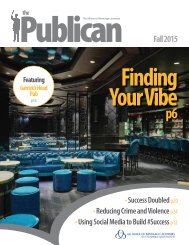POLICY DIRECTIVE No 16 - 14
policy-directive-2016-14
policy-directive-2016-14
Create successful ePaper yourself
Turn your PDF publications into a flip-book with our unique Google optimized e-Paper software.
Liquor Control and Licensing Branch<br />
<strong>POLICY</strong> <strong>DIRECTIVE</strong><br />
<strong>No</strong>: <strong>16</strong> - <strong>14</strong><br />
Date: October 20, 20<strong>16</strong><br />
To: All LCLB Staff<br />
All licensees<br />
All industry associations<br />
All local government, First Nations and police agencies<br />
Re: General policy changes for all licensees and additional policy changes for<br />
UBrews/UVins and Licensee Retail Stores<br />
Please note: These policy changes will come into effect on January 23, 2017<br />
1. Licence transfers: The new owner of the business is now liable for the<br />
establishment<br />
Current Policy<br />
The former owner of the business is liable for any contraventions of the Act, Regulation or terms and<br />
conditions of the licence at the establishment until the Liquor Control and Licensing Branch (the branch)<br />
decides whether to approve or deny the licence transfer.<br />
New Policy<br />
The new owner of the business is legally considered to be the licensee when a complete transfer<br />
application is received and the branch sends a notification to confirm. The new owner is liable for any<br />
contraventions of the Act, Regulation or terms and conditions at the establishment until the branch<br />
decides whether to approve or deny the licence transfer.<br />
Explanation<br />
It is more fair to hold the person operating the establishment, rather than the former owner, accountable<br />
for contraventions that occur while the branch is assessing whether to approve or deny the transfer.<br />
2. Removal of resident manager requirement and assigning a licensee<br />
representative<br />
Current Policy<br />
Licensees residing outside of B.C. or who are not on-site daily to manage the establishment are required<br />
to apply to the branch to assign a resident manager who is primarily responsible for the day-to-day<br />
operations. Agent licensees who reside outside of B.C. are exempt from the requirement to hire a<br />
resident manager.<br />
New Policy<br />
There is no longer a legislative requirement to assign a resident manager as the residency requirements<br />
of a licensee have been removed from the Act. Licensees may hire a manager to oversee the day-to-day<br />
operations of the establishment, but branch approval is not required.<br />
Licensees may authorize a representative to take specified actions on the licensee’s behalf and to legally<br />
bind the licensee in respect of those matters. Examples include communicating with the branch, signing a<br />
licence change application and acting as the contact for the application, and attending enforcement<br />
hearings. Licensees can submit a notification form at no cost to specify the responsibilities assigned to<br />
Page 1 of 6
the licensee representative. The representative holds those responsibilities until the licensee advises the<br />
branch to remove them as the representative.<br />
Explanation<br />
Removing residency requirements and the need for a resident manager reduces red tape and aligns with<br />
international trade agreements. The option for licensees to designate an authorized representative<br />
provides increased flexibility and convenience for licensees when interacting with the branch.<br />
3. Streamline a requirement that changes in corporate share ownership must be<br />
reported to the branch<br />
Current Policy<br />
For private companies, all share transfers must be reported. The branch requires criminal record checks<br />
for anyone with 10% or more shares in a licensee corporation (directly or via subsidiaries). The branch<br />
also uses the list of shareholders to review tied house relationships.<br />
New Policy<br />
Licensees will be required to report all external transfer of shares respecting the licensee to the branch. A<br />
licensee must also report an internal transfer of shares respecting the licensee, except for:<br />
• The removal of shareholders or<br />
• The redemption or dissolution of shares<br />
However, please note that licensees must still report an internal transfer of shares respecting the<br />
licensee, regardless of the above two exemptions, if:<br />
• The licence has been identified as having an association with another licence (a tied house), OR<br />
• The removal of the shareholder or redemption or dissolution of shares results in any of the<br />
remaining shareholders transitioning from owning less than 10% of voting shares to owning 10%<br />
or more of voting shares in the licensee corporation.<br />
Explanation<br />
This change reduces red tape while ensuring that the branch is able to ensure licensees are fit and<br />
proper and monitor tied house associations.<br />
4. Serving it Right<br />
Current Policy<br />
All licensees must obtain Serving it Right (SIR) certification in order for an establishment to become<br />
licensed.<br />
New Policy<br />
SIR certification is no longer an eligibility criteria for licensing, but it is an operating requirement. All<br />
licensees, managers and staff must obtain SIR certification prior to working in a licensed establishment.<br />
5. Serving It Right – record-keeping requirements<br />
Current policy<br />
Licensees must ensure employees take Serving It Right and keep photocopies of their Serving It Right<br />
certificates ready for inspection by a liquor inspector or police officer at all times.<br />
New policy<br />
Licensees must ensure they and their employees take Serving It Right and keep records of the Serving It<br />
Right certificate number for each person, as well as the expiry date on the certificate, if applicable. This<br />
information must be ready for inspection by a liquor inspector or police officer at all times.<br />
Explanation<br />
Page 2 of 6
Ensuring servers have valid SIR certification is an important way to prevent overservice and service to<br />
minors.<br />
6. Permit local governments/First Nations to delegate licensing decisions to staff<br />
Current Policy<br />
Local government/First Nation comments and recommendations on licence applications must be<br />
submitted in the form of a formal council resolution.<br />
New Policy<br />
Local governments/First Nations can create a bylaw that gives staff the authority to provide comment and<br />
make recommendations on licence applications.<br />
Explanation<br />
This provides flexibility for local governments to streamline their process for providing comments on<br />
applications.<br />
7. Age of a shareholder will only be considered if they own more than 10% shares<br />
Current Policy<br />
A minor (anyone under 19) cannot be a shareholder in a licence. Shares for minors must be held by a<br />
trustee.<br />
New Policy<br />
A minor (anyone under 19) can now be a shareholder in a licence, as long as they own less than 10% of<br />
shares in a licensee corporation.<br />
Explanation<br />
Reduces red tape. Minors with less than 10% of shares do not have sufficient control over the operation<br />
of the establishment to require that a trust be established.<br />
8. Broaden who can advertise liquor<br />
Current Policy<br />
Only government and private liquor stores regulated by the Liquor Distribution Branch, licensed<br />
manufacturers and licensed establishments can promote liquor under restricted advertising terms.<br />
New Policy<br />
Government and private liquor stores regulated by the Liquor Distribution Branch, licensed<br />
manufacturers, licensed establishments and public special events can promote liquor under restricted<br />
advertising terms. In addition, you don’t need to be a licensee to advertise where liquor is sold and the<br />
type of liquor available, however the advertisement can’t mention liquor manufacturers, brands or prices.<br />
Private special events continue to be prohibited from advertising liquor or its availability.<br />
9. Update conditions for dormant licences<br />
Current Policy<br />
There is no restriction on how long a licence can be dormant (licensed but not operational). Liquor<br />
primaries coming out of dormancy are not required to fulfill additional community impact consultation.<br />
New Policy<br />
Licences will be cancelled after two years of inactivity unless there has been a fire or other catastrophe<br />
beyond the licensee’s control and the required renovations take longer than two years. In the case of<br />
extensive renovations that take longer than two years, the branch requires evidence that renovation work<br />
is progressing before approving an extension to dormancy. Licensees are required to notify the branch<br />
when they transition in and out of dormancy. If an establishment has multiple service areas, the licence is<br />
only considered dormant if all areas are not operating. All licences that are currently dormant have until<br />
January 22, 2019 to restart operations, unless they qualify for an extension to dormancy status.<br />
Page 3 of 6
Explanation<br />
Dormant licences can adversely affect communities and other licensees. For example, a Licensee Retail<br />
Store (LRS) licence that is inactive for many years can maintain its location, which prevents another LRS<br />
from locating within 1 km. Also, dormant liquor primary licences may start operating again after many<br />
years of inactivity and adversely affect the community, which may have changed significantly over time.<br />
10. Sponsorship<br />
Current Policy<br />
Manufacturers must notify the branch if they are sponsoring an event at a licensed establishment, and<br />
must specifically post social responsibility materials at sponsored events.<br />
New Policy<br />
Manufacturers no longer have to notify the branch if they are sponsoring an event at a licensed<br />
establishment. There is no longer a requirement to post social responsibility material specifically for<br />
sponsored events. (Manufacturers, like all licensees, must post social responsibility material in their<br />
establishments.)<br />
11. Right to refuse certain reapplications<br />
Current Policy<br />
The branch may refuse to accept a reapplication for liquor primary establishments if it had previously<br />
been denied in the past two years.<br />
New Policy<br />
The branch may refuse to accept a reapplication from the same establishment for a licence, an<br />
endorsement or an amendment previously denied unless:<br />
• it has been more than two years since the previous application was denied based on a<br />
recommendation from a local government/First Nation, or<br />
• there have been changes to the Act, the Regulation or in the new application that warrant a<br />
reapplication<br />
Explanation<br />
This provides consistency for all applications, and allows the branch to focus on processing applications<br />
that are likely to be successful.<br />
12. New and updated definitions for service area, establishment, event site<br />
New definition in the Act:<br />
- The definition of “service area” is an establishment or event site or that part of an establishment<br />
or event site where a licence, permit or authorization allows liquor to be sold, served or consumed<br />
Updated definitions in the Act:<br />
- The definition of "establishment" has been updated to mean a place, premises or vehicle (not<br />
including a motor vehicle) that is the subject of a licence<br />
- The definition of “event site” has been updated to mean the place, premises or vehicle referred<br />
to in an authorization or permit<br />
13. Provide flexibility to extend the hours of liquor service in exceptional<br />
circumstances<br />
Current Policy<br />
Licensed establishments are permitted to serve liquor between 9 a.m. and 4 a.m. Liquor stores are<br />
permitted to operate between 9 a.m. and 11 p.m. Extended liquor hours are not permitted. For example, a<br />
licensed establishment can open outside the permitted liquor hours to host a special event, such as a<br />
Olympic hockey game starting at 7 a.m., but liquor must not be served until 9 a.m.<br />
New Policy<br />
In exceptional circumstances, licensees can apply in writing to request branch approval to serve liquor at<br />
their establishment outside the permitted hours. The licensee should submit a detailed rationale for the<br />
exceptional circumstance. The branch has the authority to temporarily or permanently extend liquor hours<br />
Page 4 of 6
in exceptional circumstances, as long as it is not contrary to the public interest or safety.<br />
<strong>14</strong>. Dispensing Liquor and Liquor Infusions<br />
Current Policy<br />
Licensees must pour and mix drinks in full view of patrons.<br />
Licensees may not infuse liquor or age cocktails at their establishment.<br />
New Policy<br />
Licensees are no longer required to pour and mix drinks in full view of patrons.<br />
Licensees can now infuse liquor and age cocktails at the establishment, provided it is done in a container<br />
other than the original container the liquor was in when legally purchased. All conditions outlined in the<br />
terms and conditions of a licence must be met when infusing liquor or ageing cocktails.<br />
15. Reporting Requirements<br />
Current Policy<br />
Licensees are required to report specified changes to the licence and/or licensee to the branch before the<br />
change is made or after the change is made, as part of the terms and conditions of their licence.<br />
New Policy<br />
Licensees are now required to report specified changes to the licence and/or changes to the licensee to<br />
the branch - in some cases before the change happens – and in other cases, within 10 days of the<br />
change. A table of the changes that must be reported to the branch, and the reporting requirements, is<br />
contained in the new terms and conditions of your licence. Please see the terms and conditions for more<br />
details.<br />
Explanation<br />
Providing a timeframe to report changes provides clarity for licensees about their obligations, and ensures<br />
that the branch has timely access to the information it needs to effectively supervise licensees.<br />
<strong>16</strong>. Change to process for applications requiring a criminal record check<br />
Current Policy<br />
For applications requiring a criminal record check, applicants must complete Consent for Disclosure of<br />
Criminal Record Information and Personal History Summary and Consent to Criminal Record Search<br />
forms. These forms give the branch the authority to work with the Ministry of Justice to complete criminal<br />
record checks on behalf of applicants.<br />
New Policy<br />
For applications requiring a criminal record check, applicants must now first apply for their criminal<br />
record check at their local police or RCMP detachment and then provide the completed criminal<br />
record check to the branch, along with their application. In addition, all applicants must complete a<br />
streamlined Personal History Summary form.<br />
For applicants residing outside of Canada, the Personal History Summary form contains instructions<br />
about how to obtain a declaration signed by a lawyer, <strong>No</strong>tary Public or Commissioner for Taking<br />
Affidavits in lieu of a criminal record check.<br />
Explanation<br />
This policy change will speed up the application process for many applicants. The current process results<br />
in delays because a large number of application forms are not correctly completed by applicants, and<br />
must be returned by the branch. In addition, applicants with past charges or convictions will now be able<br />
to provide details immediately upon application, which will eliminate the need for branch staff to follow up.<br />
Additional policy changes for UBrews/UVins and Licensee Retail Stores:<br />
1. UBrew and UVin record-keeping and reporting requirements<br />
Current Policy<br />
Page 5 of 6
UBrews and UVins must keep all records for three years.<br />
UBrews and UVins must report the volume of liquor produced at their facility semi-annually.<br />
New Policy<br />
UBrews must keep all records for six years.<br />
UBrews must report the volume of liquor produced at their facility annually.<br />
Explanation<br />
This policy aligns with the recording-keeping requirements of the Canada Revenue Agency and other<br />
licence types.<br />
2. Hours for UBrews/UVins<br />
Current Policy<br />
UBrews and UVins may only operate between 9 a.m. and 11 p.m.<br />
New Policy<br />
The regulations no longer restrict hours of operation for UBrews and UVins.<br />
Explanation<br />
These businesses do not sell liquor. Hours of operation are typically set by local business licensing<br />
bylaws.<br />
3. Remove restrictions on keg sizes for Licensee Retail Stores<br />
Current Policy<br />
Licensee Retail Stores may only sell kegs of beer or cider that are less than 30 litres.<br />
New Policy<br />
There is no longer a restriction on the size of kegs of beer or cider that can be sold by Licensee Retail<br />
Stores.<br />
4. Home-brewed beer and wine<br />
Current Policy<br />
Home-brewed beer and wine must be manufactured at a private residence.<br />
New Policy<br />
Home-brewed beer and wine can be manufactured at a location other than a private residence, as long<br />
as it is not manufactured in a public place. For example, manufacturing may take place at a private<br />
business, a private warehouse etc.<br />
Further Information<br />
Further information regarding liquor control and licensing in British Columbia is available on the Liquor<br />
Control and Licensing Branch website at http://www.pssg.gov.bc.ca/lclb/. If you have any questions<br />
regarding these changes, please contact the Liquor Control and Licensing Branch toll free in Canada at<br />
1-866-209-2111 or 250 952-5787 if calling from the Victoria area.<br />
Original signed by<br />
Douglas Scott<br />
Assistant Deputy Minister and General Manager<br />
Page 6 of 6




